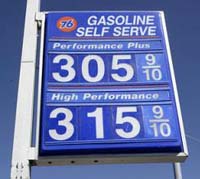Oil prices rise amid worries about Nigeria, Iran
Oil prices rose Monday as lingering concerns about unrest in Nigeria and the possibility of U.N. sanctions against Iran outweighed optimism on the rise in global inventories. A snowstorm in the upper Midwest of the U.S. also lent support to prices on expectations that home-heating demand would rise.

Light, sweet crude for April delivery climbed 79 cents to $60.75 a barrel on the New York Mercantile Exchange. On London's ICE Futures exchange, Brent crude for April traded 52 cents higher at $61.35 a barrel. Gasoline futures rose more than three cents to $1.72 a gallon. Heating oil futures gained more than four cents to $1.727 a gallon, while natural gas rose 30.4 cents to $6.95 per 1,000 cubic feet.
Despite nagging supply worries because of unrest in Nigeria and Iran's nuclear standoff with the West, brokers say strong fundamentals could start to drag prices lower with U.S. crude and product stocks at multiyear highs. Gasoline futures had rallied last week on expectations that inventories would be drawn down as refineries in the United States reduce output while undergoing spring maintenance.
The U.S. Energy Information Administration reported last week that commercial gasoline stocks fell 1.1 million barrels to 224.8 million barrels as refiners lowered utilization by 2.2 percentage points to a relatively low 83 percent of operating capacity. But the EIA said U.S. crude stocks rose by 6.8 million barrels to 335.1 million barrels in the week ended March 3 the highest level since 1999.
Sucden Commodity brokers said oil prices are likely to remain volatile because of anxiety about potential supply disruptions due to Iran's nuclear dispute and violence in Nigeria's oil delta.
Kuwaiti oil minister Sheik Ahmed Fahd Al Ahmed Al Sabah has said he believes political turmoil and extremism have added $5 to $8 to the price of a barrel of oil. Iran, the No. 2 producer within the Organization of Petroleum Exporting Countries, ruled out a Russian proposal aimed at easing tensions over its nuclear program.
Iranian Foreign Ministry spokesman Hamid Reza Asefi also warned on Sunday that Iran is considering large-scale uranium enrichment at home as a response to the International Atomic Energy Agency's decision to refer Tehran to the Security Council for possible trade sanctions. Iran says its nuclear program is aimed at generating energy, while the United States contends that Tehran is working toward developing a nuclear weapon. In Nigeria, recent attacks by militants on pipelines and oil facilities have left the country's production down by about 400,000 barrels a day, reports the AP.
N.U.
Subscribe to Pravda.Ru Telegram channel, Facebook, RSS!


